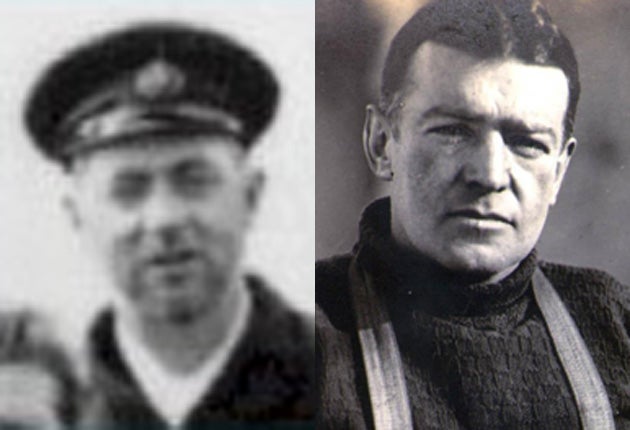Henry McNish: The shipwright Shackleton forgot
Henry McNish played a vital role in saving the expedition, yet he was denied a Polar Medal. Jonathan Brown reports

It was the greatest snub in the golden age of exploration. When Ernest Shackleton returned in 1917 from his failed mission to conquer the Antarctic, it fell within his gift to recommend his men for the Polar Medal. Of the 27 who served beneath him during the attempt to cross the continent via the South Pole, all but four had their names put forward to King George V. The decision to leave out three trawlermen – Vincent, Holness and Stephenson – was regrettable. But the omission of the fourth, Henry "Chippy" McNish, has rankled with polar enthusiasts and, say some, has blemished the reputation of Shackleton himself.
A campaign for a posthumous Polar Medal for the Port Glasgow-born carpenter and shipwright is now gathering pace. Bill Wilson, a Scottish National Party MSP for the West of Scotland, has been lobbying for McNish after being contacted by a constituent. The campaign has the backing of the McNish family who believe their forebear's role has been deliberately overlooked. Mr Wilson conceded that personal differences between the Scot and his leader did him no favours. "Chippy was not known for his diplomatic skills, but that's no reason not to acknowledge his contribution," he said. "It is a shame that this brave man never received this honour."
The Scotsman's trade earned him the nickname Chippy which he passed on to the mission's mascot, Mrs Chippy the ship's (male) cat. But it was a dispute with Shackleton over his decision to have the animal put down along with the dog teams once the crew had been forced to abandon the ice-smashed Endurance, which exacerbated the differences between the men.
At 40, McNish was the oldest on the expedition, an accomplished sailor and versatile craftsman, a life-long socialist and a devout member of the United Free Church of Scotland who abhorred the use of bad language.
Accomplished and certain in his own actions, he was quick to point out the shortcomings of others. But the men, though many did not like him, respected and relied on him. Shackleton, however, expressed reservations about McNish in letters written from South Georgia in 1914 describing him as "the only man I am not dead certain of". He is "a very good workman and shipwright, but does nothing I can get hold of".
The flashpoint came in December 1915 when McNish questioned Shackleton's order to drag the lifeboats across the pack ice after the destruction of the Endeavour. His insubordination earned him a "logging" and is the most likely reason for his exclusion from the Polar Medal List.
Shackleton deployed both logic and force to counter the insurrection – reminding him with a brandished pistol that he had agreed to serve under him both on ship and ashore. In the end, dragging the boats proved impossible and Shackleton ordered the men to turn back. In his diary, he wrote: "Everyone working well except the carpenter. I shall never forget him in this time of strain and stress."
But McNish's skill and ingenuity in events which followed is still remembered. After 16 months trapped on the ice, the men set sail in the three small boats for Elephant Island. Eight days after their arrival, one of the vessels, the 20ft whale boat James Caird, struck out for South Georgia – a journey of 670 miles – with six men on board, including McNish. It was only possible because, during their time trapped on the ice, McNish worked tirelessly to ensure the seaworthiness of the escape craft.
He had devised his own mixture of flour, oil paint and seal blood to caulk the seams of the boats, raised the gunwales to make them safer in the high seas and and fitted small decks fore and aft to the Caird. Before Shackleton, and two others, set off for the final 36 hour traverse of South Georgia's mountain ranges, he fashioned crampons out of the boat's two inch brass screws. "We certainly could not have lived through the voyage without it"; Shackleton wrote later of his carpenter's efforts.
Like Shackleton, McNish was never to recover his health fully. He returned to the Merchant Navy but suffered severe pain brought on by the months stranded at the Pole. He eventually died in Wellington Hospital in New Zealand where he was treated as a hero and given a funeral with full naval honours paid for by the New Zealand government.
Subscribe to Independent Premium to bookmark this article
Want to bookmark your favourite articles and stories to read or reference later? Start your Independent Premium subscription today.

Join our commenting forum
Join thought-provoking conversations, follow other Independent readers and see their replies